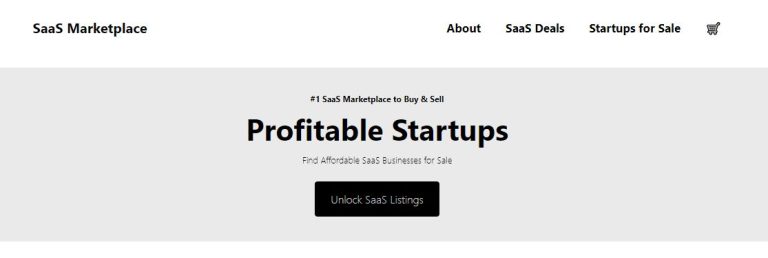
The world of software-as-a-service (SaaS) has revolutionized how businesses operate, offering scalable, on-demand software solutions that cater to a wide array of needs. Within this dynamic ecosystem, saas marketplace have emerged as vital platforms, connecting buyers and sellers of SaaS applications. These marketplaces provide a centralized hub where startups can showcase their products and potential buyers can find the software solutions that best fit their requirements. Understanding the benefits and features of these platforms can help both sellers and buyers make informed decisions.
A SaaS marketplace is an online platform where SaaS providers list their applications, allowing potential customers to browse, compare, and purchase software solutions. These platforms often offer a range of tools and resources to help sellers optimize their listings, attract more customers, and streamline the sales process. For buyers, SaaS marketplaces provide an easy way to discover new applications, read reviews, and access free trials or demos before making a purchase decision.
One of the primary benefits of using a SaaS marketplace for sellers is increased visibility. By listing their products on a popular marketplace, startups can reach a wider audience than they might through their own marketing efforts. This increased exposure can lead to higher sales and faster growth. Many SaaS marketplaces also offer marketing and promotional support, helping sellers to effectively target their ideal customers.
For buyers, SaaS marketplaces offer a convenient and efficient way to find the software solutions they need. These platforms often feature a wide range of applications, categorized by industry, function, or specific use case. This makes it easy for buyers to compare different options and find the best fit for their needs. Additionally, many SaaS marketplaces provide user reviews and ratings, offering valuable insights into the performance and reliability of various applications.
Another key advantage of SaaS marketplaces is the opportunity for startups to sell their business. For entrepreneurs looking to exit or pivot, these platforms provide a marketplace to list their entire SaaS business for sale. Potential buyers, including investors and other businesses, can browse these listings and acquire established SaaS companies with a proven track record. This can be an attractive option for both parties, offering sellers a lucrative exit strategy and buyers an opportunity to acquire a turnkey business.
The process of selling a SaaS business through a marketplace typically involves several steps. Sellers need to create a detailed listing, including information about their product, customer base, financial performance, and growth potential. Many marketplaces also offer valuation tools and resources to help sellers determine a fair asking price. Once the listing is live, potential buyers can reach out with inquiries, negotiate terms, and ultimately complete the purchase through the platform.
For buyers, purchasing a SaaS business through a marketplace can be a strategic move to quickly enter a new market or expand their existing product portfolio. These marketplaces often provide detailed information about each listing, allowing buyers to conduct thorough due diligence before making an offer. This transparency helps buyers assess the potential return on investment and make informed decisions.
Security and trust are crucial aspects of SaaS marketplaces. Reputable platforms implement strict vetting processes to ensure that listed products and businesses are legitimate and meet certain quality standards. This helps protect both buyers and sellers from fraud and ensures a positive experience for all parties involved.
SaaS marketplaces also facilitate ongoing support and updates for purchased applications. Many platforms offer integrated tools for managing subscriptions, handling customer support, and delivering updates or new features. This helps ensure that buyers can continue to rely on their SaaS solutions long after the initial purchase.
In conclusion, SaaS marketplaces play a pivotal role in the SaaS ecosystem, providing a centralized platform for buying and selling software applications. For sellers, these marketplaces offer increased visibility, marketing support, and a potential exit strategy. For buyers, they provide a convenient way to discover, compare, and purchase SaaS solutions, as well as opportunities to acquire established businesses. As the SaaS industry continues to grow, the importance of these marketplaces will only increase, making them essential tools for both startups and established businesses.




